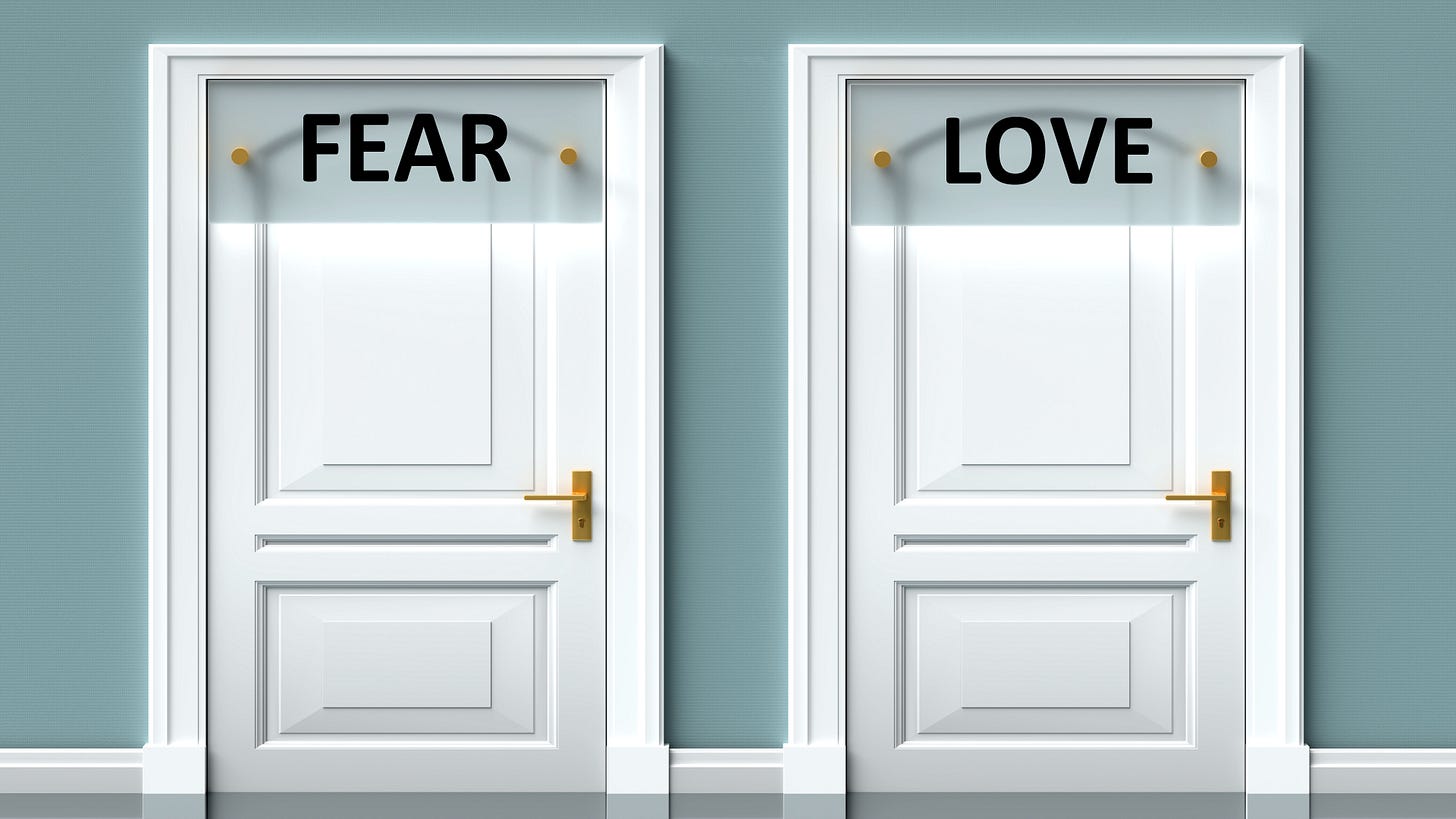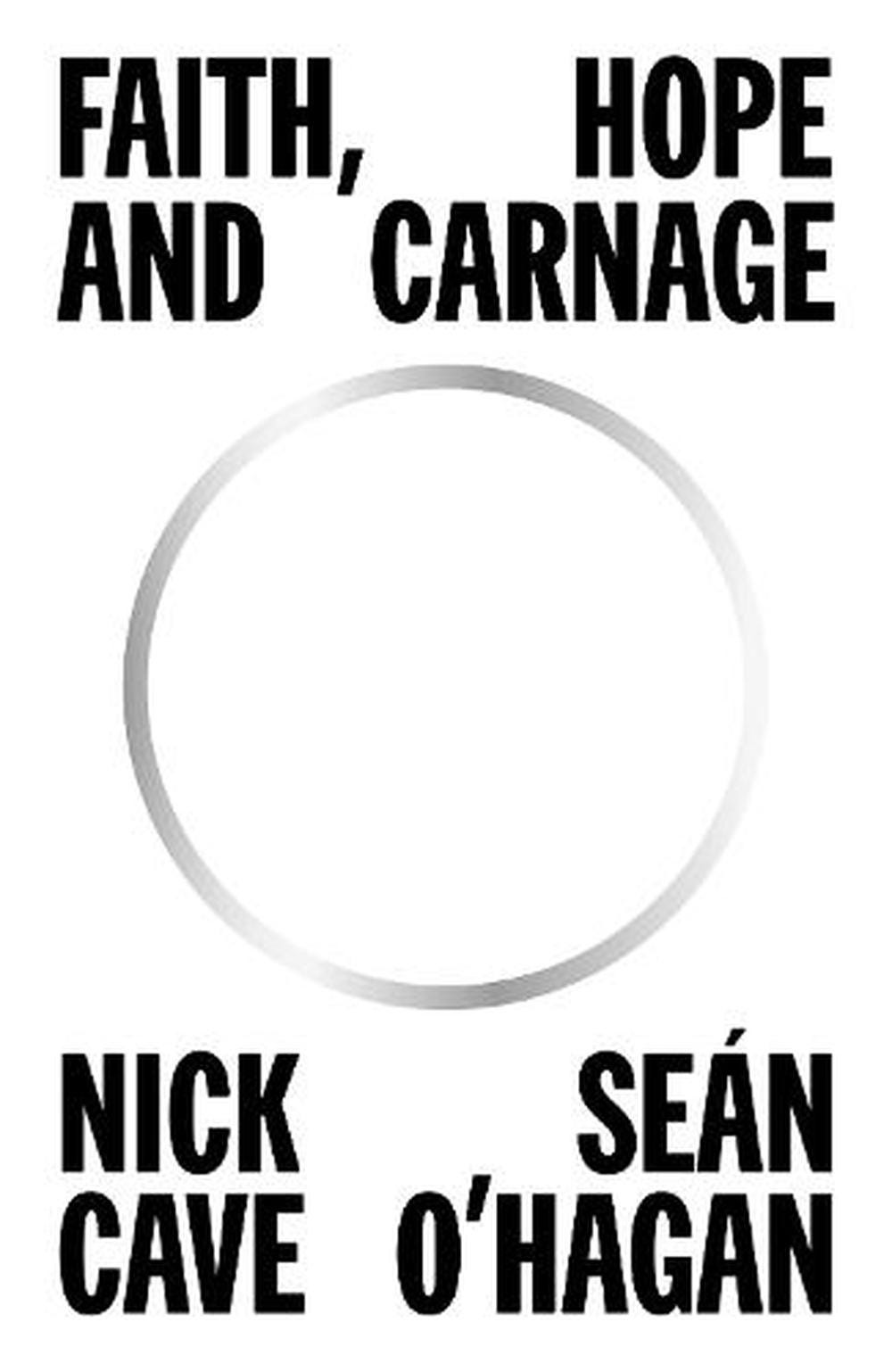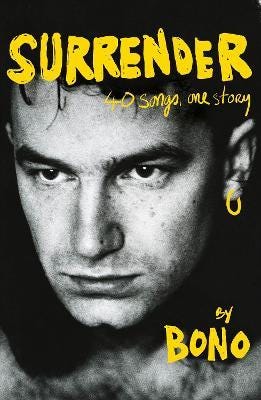If there's no fear in love, why is it so bloody terrifying
Maybe the ancient wisdom is wrong, and perfect love doesn't cast out fear ... or maybe what I'm experiencing isn't perfect love.
There is no fear in love, the early church wisdom says. In fact, they can’t coexist in the same space. They’re like being and nothingness — where one is, the other isn’t. The wisdom says more: perfect love drives out fear. How come? Because fear has to do with punishment, it says — the sense we all have, to some degree, and at one time or another, that we deserve some form of payback. But perfect love insists that we have nothing to pay — that we’re treasured just as we are, in all of our otherness ... in all of our weakness and strength; loveliness and ugliness; in everything about us that is cool or uncool.
And if we’re still afraid? Well, says the wisdom, it’s not perfect love. It’s something else.
I can’t remember the first time I came across the idea that the opposite of love isn’t hate but fear. I do remember though that it immediately resonated. Even if at the time I didn’t know what it meant.
I’m not sure you can know how fear is the antithesis of love unless you’ve experienced how love encounter — in which you know that your otherness is being treasured for what it is, as you also treasure the otherness of the other — is able to unlock those parts of you that you may not even have known existed.
Of course, having discovered this, which means also coming to the realisation that staying in touch with those parts of you requires love to persist, then the loss of that love results not only in grief for the absence of the other, but despondency and even despair that those parts of you have become inaccessible again.
When I was younger, I had the emotional elasticity to bounce back from all sorts of loss — I’m talking about the loss of people through death, or friendships because they moved away or because I moved away, and then of course the end of romantic relationships — so these types of losses weren’t yet to be feared. I hadn’t yet discovered the importance of love in terms of what love magnified within me, as well as in the other. But with age (and let’s be honest, I’ll never see 40 again) — and experience — that elasticity isn’t what it was (like the elastic in my favourite undies — knackered!).
Let me stress again, I’m not talking necessarily about love as a romantic experience or involving sexual attraction, but of true love encounter with anyone, at any point on the spectrum from sexual intimacy through to the kindness shared by strangers in fleeting moments. Wherever relationship is experienced on that spectrum, love encounter opens ways of knowing that tap rich veins of resource — in terms of creativity, hope, purpose, belonging, healing, energy — that are not apparent to us outside of genuine encounter with another.
So where does fear come in?
In my recent experiences, fear clusters around the loss of those resources when love relationship breaks down (for whatever reason). Imagine discovering a new level of creative energy, or a deeper sense of healing from old wounds, or genuinely unparalleled hope, or a sharper, more defined sense of purpose, a warm sense of belonging that you haven’t felt since childhood Christmases ... and then experiencing the dissipation of those things as the encounter is taken away. That’s something to be feared ... and avoided at all costs.
If you’re willing, that is, to live a life devoid of love encounter, in order to stave off the pain of losing it.
I’ve been reading two recently released books by two of my favourite musicians ... Nick Cave and Bono, both of whom have been radically shaped by loss throughout their lives and artistic careers. I’ve been fascinated by the comparative journeys of these two for a long time, since for both of them faith expression is a core component of their (more often than not) secular songs — though from very different perspectives. It’s been interesting to discover, however, that as they get older, their faith language bears striking similarities.
In his book Faith, Hope and Carnage, which is a series of interviews with Cave conducted by his friend, journalist Sean O’Hagan, Cave talks a lot about the death of his son, Arthur, who died in 2015 at the age of 15 after falling from a cliff in Brighton, England, during hallucinations brought on by LSD.
He doesn’t talk about the event as much as the aftermath, for him and his wife Susie, and the enormous sense of spiritual yearning he experienced as he confronted the loss of a beloved child. He even goes so far as to say he’s come to believe that God is the trauma itself.
I’ll let Nick Cave explain what he means:
That perhaps grief can be seen as a kind of exalted state where the person who is grieving is the closest they will ever be to the fundamental essence of things. Because in grief, you become deeply acquainted with the idea of human mortality. You go to a very dark place and experience the extremities of your own pain — you are taken to the very limits of suffering. As far as I can see, there is a transformative aspect to this place of suffering. We are essentially altered or remade by it. Now, this process is terrifying, but in time you return to the world with some kind of knowledge that has something to do with our vulnerability as participants in this human drama. Everything seems so fragile and precious and heightened, and the world and the people in it seem so endangered, and yet so beautiful. To me it feels that, in this dark place, the idea of a God feels more present or maybe more essential. It actually feels like grief and God are somehow intertwined. It feels that, in grief, you draw closer to the veil that separates this world from the next. I allow myself to believe such things, because it is good for me to do so.
What’s interesting to me is that the way Cave thinks about the experience of loss and trauma (and finding God there), is how I think of love encounter (and finding God there instead). I haven’t thought about the loss of love as the place where I draw closer to God, but when I think about it, that idea is more consistent with the Psalms and some of the Old Testament wisdom literature. But it goes to show, yet again, that often the words love and suffering are interchangeable, in terms of how people experience that “exalted state”, when they’re experiencing intense moments of either one.
In Bono’s new memoir, Surrender: 40 songs, One story, he talks about losing his mother at the age of 14, after she suffers an aneurysm at the graveside of her father, during her father’s funeral:
Three days later Norman and I are brought into the hospital to say goodbye to my mother. She’s alive but barely. The local clergyman, Sydney Laing, whose daughter I’m dating, is here. Ruth is outside the hospital room, wailing. And Barbara. And my father, whose eyes appear to have less life in them than my mother. Norman and I enter the emergency room at war with the universe, but Iris looks peaceful. It’s hard to figure that a large part of her has already left. I am reminded that with faith the size of a mustard seed you can move a mountain. But this mountain is my mother’s mortality, and it won’t get out of the way. We hold her hand and say goodbye. There’s a clicking sound, but we don’t hear it. The sound of a switch. The machine that keeps Iris warm is turned off. Electricity. This mortal coil. Gone.
What’s remarkable about Bono’s experience at 14 is that it shapes the rest of his life, in terms of the rane he still feels at her absence and the type of domestic life that followed, in which he, his father and his brother Norman, never spoke of Iris, his mother, again. And he’s very transparent about the fact that when he met his future wife, Ali, his experience of love with her went a very long way to replacing the loss of his mothe. That very same month, he and three other boys from school got together and formed … U2.
Did trauma generate this? Or did his experience of love? Perhaps it was both. What’s obvious though is that the teenage boy who set out to conquer the world through song was not possessed by fear.
My recent thoughts have not been about the loss of encounter caused by death, but the breakdown of friendships. And yet, I find that the words people use when they reflect on death resonate more with my experience of relational loss than the typical ways people speak about how it feels when relationships break down. The feeling is the same. The impact is certainly the same. Perhaps the one key difference is that as long as the other is alive, there is always the opportunity for redemption, and for reunion.
But the fear is real. Who will I be when the encounter has ended? I fear the loss of those things described above, such as purpose and hope and creative energy. And yes, like others, I do slip into the belief that it might be better to have never experienced those things, than to enjoy them for a season and then lose them again. The loss is not felt so much in the mind for me, as the body. The pain is physical. And it awakens all the addictions, all those poor patterns of behaviour that I’ve developed over 40 years (OK, 50 years), to cope with such feelings.
So fear, in a way, is a friend. It protects me. But it’s a codependent friend, an insecure and therefore coercive friend, who makes me smaller so that I’ll keep him by my side at the exclusion of others. Which is why it can’t coexist with perfect love, because perfect love is the opposite — it wants me to be more, to have more, to experience more.
No one describes it better than James H. Olthuis in his book The Beautiful Risk — so I’ll let him bring these disparate but connected thoughts home:
So when time and again—no matter what I throw at you or how I test you, no matter how I attack or pull back or digress—you continue to announce your availability without defense or without aggression, I receive that message, even when I try to hide it. At some point, even if only briefly or partially, I—myself—make an appearance and reach out. At that moment there is the spark of connection across the gaps between us. Love comes as a response to the presence of the other. As that spark across the gaps happens more often, the connection deepens and the trust grows—a gradual and painful process, to be sure, as together we discover and explore our patterns of vulnerability and invulnerability, our hopes and fears. Still, the healing connection is deepened and nourished as I bare my wounds and let my frightened self find voice, feel heard, be seen, and be consoled. That is the beginning of the miracle of love: being open to another, guards down, and—no questions asked, no demands, no judgments—being respected, received, affirmed, and blessed. To show oneself as the person we are—wounded, blemished, hurting, longing—and to feel welcomed and accepted is to experience grace.







